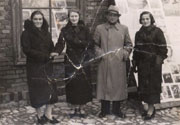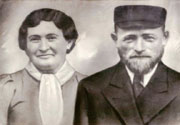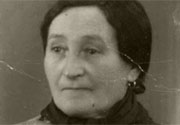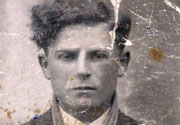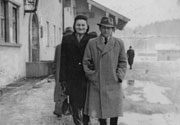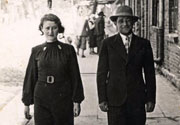Their Legacies Remain
The Gelband Family
The Gelband family in all its branches seems to have begun its sojourn in Poland in Wodzislaw, in the Kielce district. At the head of the family stood Rabbi Shmuel-Avraham Gelband (b.1859) and his wife Dvora. The family had a large cattle shed, and worked in cattle rearing and trade, and selling milk.
Shmuel-Avraham and Dvora had three children: Sara Feiga, Laibush and Yonas (Yonatan). Yonas Gelband (b. 1884) married Blima Neufeld (b. 1887, Wolbrom) in 1903 in Wolbrom, and the couple then moved to Bendin where they lived in Jasna Street. Yonas and Blima worked, like Yonas’ parents, in the local cattle trade.
The couple had six children: Shimon, born in 1903, Alter, (1905), Moshe, (1908), Menachem (1910 in Kirov), Zvi (1912) and Chava, 1919. Three of Yonas and Blima Gelband’s six children - Shimon, Alter and Zvi Gelband -and their families perished in the Holocaust. Menachem immigrated to Eretz Israel in 1933.
Moshe Gelband, who was born in Wodzislaw in 1908, lived at 26 Pilsudski Street, Wolbrom. He managed a cattle business for the Jews, and pigs for the gentiles. He was also a member of the Beitar organization in Wolbrom. Between 1929-1930, Moshe served in the Polish army. He then began his training as a butcher – most likely working in one of the Rotmensch family’s butcher’s shops – where he met his first wife Miriam (Marie/Malka), one of the Rotmensch daughters. The couple had a daughter named Dvora. Miriam and six-year-old Dvora were murdered in the Holocaust, in circumstances that remain unclear.
During the Holocaust Moshe Gelband was sent to the Niedrebice camp, near Katowice, and then on to the Duerenforth labor camp in the Bolau district, to Fünfteichen and Mauthausen concentration camp. On his arrival in Mauthausen on February 15, 1945, he was injured in his left arm by gunfire from an S.S. officer. He was liberated from the camp in May 1945.
After the war, Moshe Gelband married for a second time. His new wife was Frania (Freidel) Lustiger from Sosnowiec, the lone survivor of her family. The couple established their family anew, bearing four children, all of whom married and had children of their own.
Uri Gelband submitted the pictures and told the story of his family to Yad Vashem.
